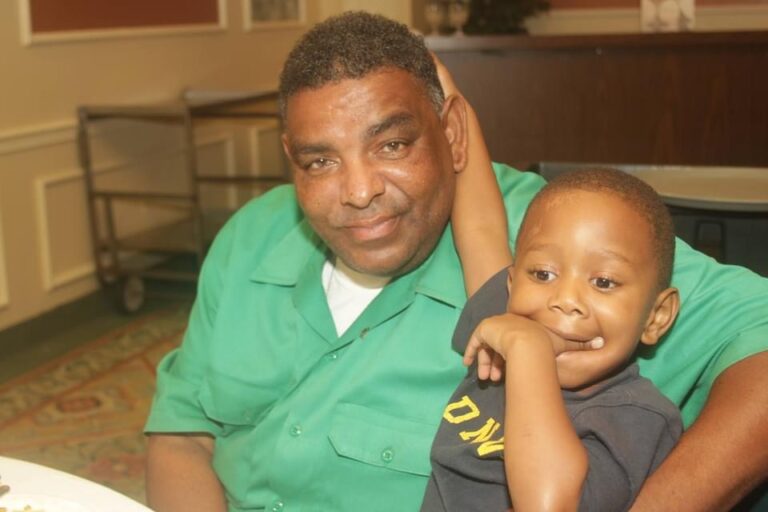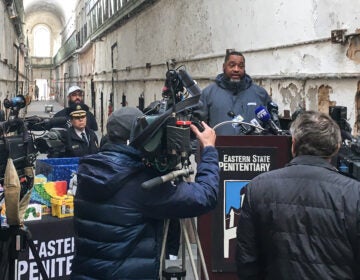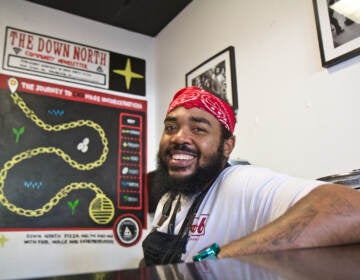Malik Aziz, ‘grandfather of returning citizens’ who fought injustice, dies at 65
The trailblazing civic leader changed attitudes about formerly incarcerated people and helped restore the vote for those with felony convictions.

Malik Aziz with his grandson. (Photo courtesy of Aziz family)
Marvin Bing, Jr. paused to collect himself during a phone interview while recalling an important moment he had with his father Malik Aziz, who died September 3.
A young, Black, politically active Bing wanted to run for president of a youth political organization, and worried the majority-white group would not accept him. That was when Aziz had a talk with his son about courage.
“What he said to me was there will be times in life that you have to present yourself to a group of people who will never understand you, but if you stay true to what you believe, whether you think those people are listening or judging you, the right thing will always follow the right people,” said Bing before taking a moment.
Aziz’s wisdom inspired his son to run for the leadership position — a move that would result in a successful campaign.
“I actually won,” Bing said. “Kudos to him. I probably wouldn’t have ran if it wasn’t for him.”
Aziz’s son is one of many people who saw their life altered by the trailblazing civic leader who changed attitudes about formerly incarcerated people, helped win a fight to restore the vote for those with felony convictions and worked tirelessly to reduce violence.
Aziz’s death at the age of 65 drew an outpouring of reverence from organizers on the frontlines of reentry work who said the Roxborough native laid the groundwork for formerly incarcerated leaders around the country to thrive.
Bill Cobb, founder of Redeemed, an organization fighting the systemic discrimination against people with arrest or conviction records, and former deputy director of the ACLU’s Campaign for Smart Justice, regards Aziz as a mentor.
“He knew what we needed and he always encouraged us to take charge and identify that and to drive that into our lives and to the community,” said Cobb.
For neighborhoods disproportionately harmed by mass incarceration, like Nicetown-Tioga where J. Jondhi Harrell founded and still directs The Center for Returning Citizens, Aziz had a profound impact. He established pathways for formerly incarcerated people like Harrell to come home and emerge as leaders able to help others and advocate for the community.
“If you work in this city and you didn’t know Malik Aziz then you weren’t really in reentry,” said Harrell, who describes Aziz’s work as foundational. “I would call him the grandfather of returning citizens in the city of Philadelphia.”
The list of Aziz’s contributions to the city spans three decades and multiple spheres of influence.
While incarcerated for drug trafficking during the mid-1990s, he founded Ex-Offenders, Inc., which gathered formerly incarcerated individuals and travelled to schools in the city to warn young people about the pitfalls of the streets. He helped former Mayor John Street get elected then served as Executive Director for the Office of Reentry, providing city support to formerly incarcerated people and resources to neighborhoods impacted when parents or breadwinners are taken away.
In 2002, he co-founded Men United for a Better Philadelphia, which has sent more than 800 men out into city neighborhoods “to spread a message of violence prevention, love and hope” over the course of 12 years. And with the creation of the National Exhoodus Council, he worked with formerly incarcerated leaders in 24 cities.
Aziz even devoted time to highlighting the impactful work of others in the city with the “Guiding Light In The Community” award. He founded it in honor of his mentor, former U.S. Representative Lucien Blackwell.
An advocate for communities hurt by violence
Antoinette Jackson-Aziz remembers her husband was full of ideas intended to benefit the city’s neighborhoods. She says, in the morning, Aziz would watch the news to identify areas most impacted by violence and come up with a plan for that community.
“We could be eating dinner somewhere and he would come up with a plan for something that was about redemption, or anti-violence,” she said. “That was his whole life.”
Bing remembers when his father traveled the country settling beefs in other cities including Chicago and Portland, Oregon.
“He understood the value of bringing people together,” said Bing, now a creative consultant based in New York. “[And] not just bringing people together, but what to do once you got them together. And that’s something that he went to his death with, believing in working towards.“
Aziz won one of his most significant achievements in 2000, when he was a plaintiff in a federal lawsuit filed against the Commonwealth of Pennsylvania that challenged a state law that banned anyone incarcerated for a felony conviction from registering to vote for five years.
Aziz, along with the Philadelphia branch of the NAACP, State Representative James Roebuck, and Alex Moody, Sr., argued the statute violated the 14th Amendment, because it barred first-time voters, but not those who registered prior to their felony conviction.
“The ban is just continued punishment for people who have already done their time,” Aziz told the Inquirer in 2000.
Months later, a Pennsylvania state court ruled that the ban was unconstitutional, giving thousands of returning citizens in Philadelphia the right to choose during elections. The decision made Pennsylvania one of 17 states that allowed ex-felony offenders the right to vote upon completion of their sentence.
Harrell says helping ex-offenders exercise their voting rights is an important part of his work at his organization, and that he himself has not missed an election since his release in 2009.
“Whatever we do, we talk about voter registration because voter registration is a privilege that our forefathers struggled, fought, and died for,” said Harrell. “So for us as returning citizens to be in one of the few states that allows you to vote, it is our obligation to vote.”
That Aziz did not get his just due for his contributions is a recurring theme that comes up when talking to those close to him. Brinkley says it used to anger him to see others mimic the blueprint Aziz laid down without giving credit where it was due.
Nevertheless, Aziz remained humble and focused.
“He didn’t care who took the credit for it,” said Greg Brinkley, a friend and colleague. “All he wanted was results.”
Editor’s note: This story has been updated to reflect Malik Aziz’s age at the time of his death and Marvin Bing, Jr.’s job title.

Subscribe to PlanPhilly
WHYY is your source for fact-based, in-depth journalism and information. As a nonprofit organization, we rely on financial support from readers like you. Please give today.








